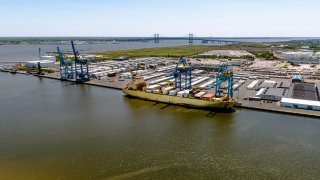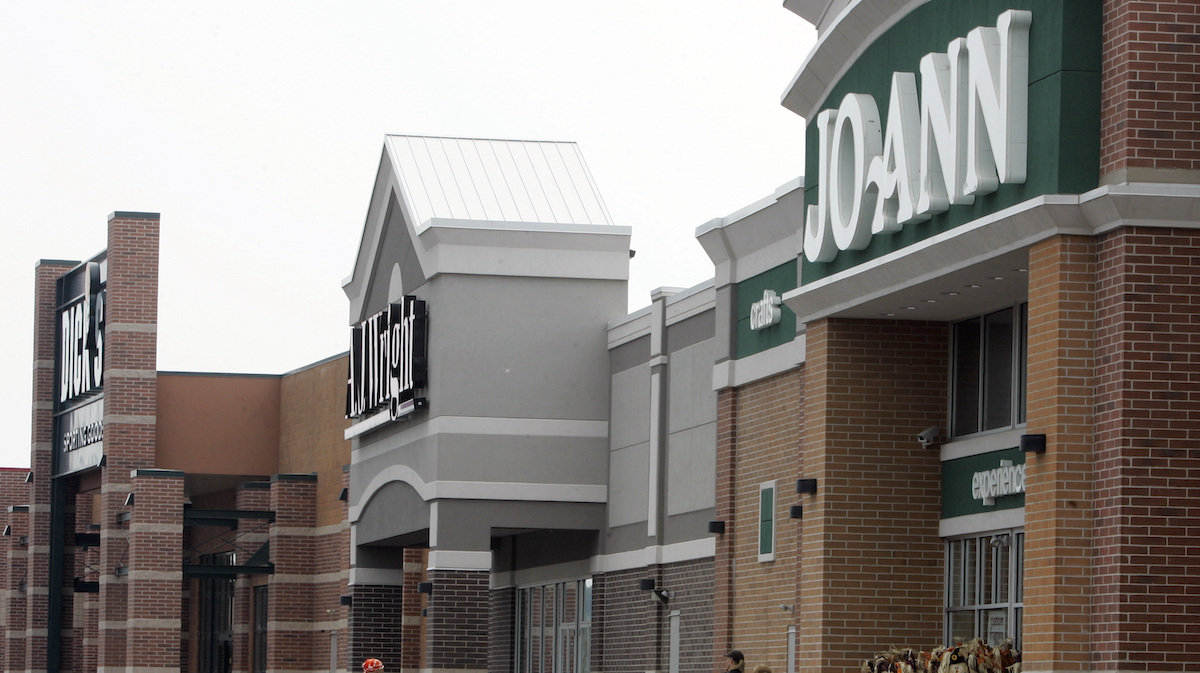
Commercial pier of the port of Wilmington, Delaware.
What to Know
- A judge says the company that privatized operations at Delaware's port owes more than $21 million in damages for breaching an agreement to buy the port’s former stevedoring firm.
- The judge on Monday also found GT USA Wilmington in contempt for using confidential information it obtained in the lawsuit filed by Murphy Marine Services to negotiate a deal with one of Murphy's largest customers. The judge ruled that GT violated a binding agreement by refusing to negotiate a definitive purchase agreement with Murphy Marine.
- GT USA Wilmington is a subsidiary of port management company Gulftainer, based in the United Arab Emirates. It obtained the rights to operate the port for 50 years in exchange for upgrades and annual fees.
The company that privatized operations at the port of Wilmington several years ago owes more than $21 million in damages for breaching an agreement to buy the port’s former stevedoring firm, a Delaware judge ruled Monday.
Vice Chancellor Lori Will also found GT USA Wilmington in contempt for violating a court confidentiality order by using materials it obtained in defending itself in a 2018 lawsuit filed by Murphy Marine Services to negotiate a deal with one of Murphy Marine’s largest customers.
Monday’s ruling came more than a year after a different Chancery Court judge ruled that GT was bound by the terms of a 2018 letter agreement regarding the purchase and sale of 100% of the equity interest of Murphy Marine.
Get top local stories in Philly delivered to you every morning. Sign up for NBC Philadelphia's News Headlines newsletter.
Will ruled Monday that GT violated the binding letter agreement by refusing to negotiate a definitive purchase agreement with Murphy Marine. She also said GT improperly used information obtained from Murphy Marine during the lawsuit to negotiate its own stevedoring contract with Dole Fresh Fruit Company.
Officials with GT USA Wilmington did not immediately respond to an email seeking comment.
GT USA Wilmington is a subsidiary of port management company Gulftainer, which is based in the United Arab Emirates. In 2018, it obtained the rights to operate the Wilmington port for 50 years in exchange for agreeing to make significant upgrades and to pay the state at least $3 million annually in concession fees.
Business
Murphy Marine is a family-owned business that was purchased in 2006 by a former longshoreman and three of his cousins through trusts, which are the company’s stockholders.
Will awarded the trusts more than $21.4 million direct damages for the loss of fair market value that GT agreed to pay for Murphy Marine’s stock. She also said the plaintiffs are entitled to pre- and post-judgment interest at a rate of 7.5%, compounded quarterly, from September 2018 to the date of payment.
Will also ordered GT to pay the legal fees and expenses incurred by Murphy Marine regarding its motion to find GT in contempt for violating a confidentiality order governing the exchange of documents in the lawsuit. According to the ruling, GT used revenue and financial information for various Murphy Marine customers to negotiate its own stevedoring contract with Dole, which had been a customer of Murphy Marine.
“That violation was not a technical one,” the judge wrote. “Rather, it is more likely than not that GT used a competitor’s obviously confidential information to negotiate with a then-current Murphy Marine customer against Murphy Marine.”
Under a privatization deal signed with Gov. John Carney's administration in 2018, Gulftainer agreed to take over operations at the port for 50 years and invest almost $600 million in port upgrades and a new container-handling terminal at Edgemoor.
State officials did not require GT to buy Murphy Marine, but both companies have said they felt “pressure” from the state to make a deal. The companies finalized the letter agreement in April 2018 and agreed shortly thereafter that KPMG would conduct a valuation analysis of Murphy Marine.
KPMG estimated Murphy Marine’s equity value to be between $21.5 million and $26.1 million.
GT officials were not happy with those numbers and asked KPMG to “fix its analysis,” according to court records. A key concern for GT was that the effect of the port privatization was not included in KPMG’s valuation, even though the parties agreed that privatization would not be considered.
Vice Chancellor Sam Glasscock III noted in a ruling last year that, if GT did not acquire Murphy Marine, its privatization of the port would have a “drastically detrimental effect” on Murphy Marine’s value.
“GT, which is the largest privately-owned port operator in the world, could have started its own stevedoring business and shuttered Murphy Marine’s business entirely by denying it access to the port,” he noted.



